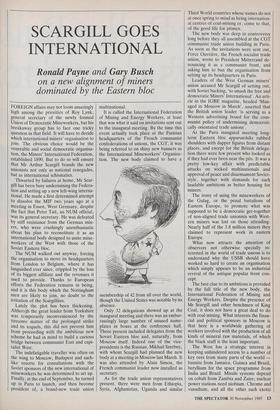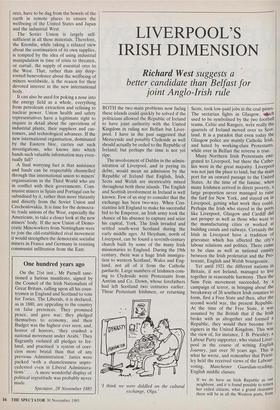SCARGILL GOES INTERNATIONAL
Ronald Payne and Gary Busch
on a new alignment of miners dominated by the Eastern bloc
FOREIGN affairs may not loom amazingly high among the priorities of Roy Lynk, general secretary of the newly formed Union of Democratic Mineworkers, but his breakaway group has to face one tricky question in that field. It will have to decide Which international miners' organisation to Join. The obvious choice would be the venerable and social democratic organisa- tion, the Miners' International Federation, established 1890. But to do so will ensure that Mr Arthur Scargill brands the new unionists not only as national renegades, but as international schismatics.
Thwarted by failures at home, Mr Scar- gill has been busy undermining the Federa- tion and setting up a new left-wing interna- tional. He made a first determined attempt to dissolve the MIF two years ago at a meeting in Essen, West Germany, despite the fact that Peter Tait, an NUM official, was its general secretary. He was defeated by stiff resistance from the German min- ers, who were crushingly unenthusiastic about his plan to reconstitute it as an international body designed to unite mine- workers of the West with those of the Soviet Eastern bloc.
The NUM walked out anyway, forcing the organisation to move its headquarters from London to Belgium, where it has languished ever since, crippled by the loss of its biggest affiliate and the revenues it used to provide. Thanks to European efforts the Federation remains in being, and it is this body which the Nottingham men are likely to join, no doubt to the irritation of the Scargillites.
Lately the plot has been thickening. Although the great leader from Yorkshire was temporarily inconvenienced by the tiresome matter of the prolonged strike and its sequels, this did not prevent him from proceeding with the ambitious new scheme he had in mind to build a curious bridge between communist East and capi- talist West.
The indefatigable traveller was often on the wing to Moscow, Budapest and such- like resorts for consultations with the Soviet sponsors of the new international of mineworkers he was determined to set up. Finally, at the end of September, he turned up in Paris to launch, and then become president of, a brand-new trade union multinational.
It is called the International Federation of Mining and Energy Workers, at least that was what it said on invitations sent out to the inaugural meeting. By the time this event actually took place at the Parisian headquarters of the French communist confederations of unions, the CGT, it was being referred to on shiny new banners as the International Mineworkers' Organisa- tion. The new body claimed to have a membership of 42 from all over the world, though the United States was notable by its absence.
Only 32 delegations showed up at the inaugural meeting and there was an embar- rassingly large number of unused name- plates in boxes at the conference hail. Those present included delegates from the Soviet Eastern bloc and, naturally, from Moscow itself. Indeed one of the vice- presidents is the Russian, Mikhail Szrebny, with whom Scargill had planned the new body at a meeting in Moscow last March. It was also attended by Alain Simon, the French communist leader now installed as secretary.
As for the trade union representatives present, there were men from Ethiopia, Syria, Afghanistan, Uganda and similar Third World countries whose names do not at once spring to mind as being internation- al centres of coal-mining or, come to that, of the good life for pitmen.
The new body was deep in controversy long before they all assembled at the CGT communist trade union building in Paris, As soon as the invitations were sent out, Force Ouvriere, the French socialist trade union, wrote to President Mitterrand de- nouncing it as a communist front, and asking him to ban the organisation from setting up its headquarters in Paris.
Leaders of the West German miners' union accused Mr Scargill of setting out, with Soviet backing, 'to smash the free and democratic Miners' International'. An arti- cle in the IGBE magazine, headed 'Man- aged in Moscow in March', asserted that the British union leader 'is serving as a Western advertising board for the com- munist policy of undermining democrati- cally orientated trade unions'.
At the Paris inaugural meeting long- term Eastern bloc apparatchiks rubbed shoulders with dapper figures from distant places, and except for the British delega- tion there were few present who looked as if they had ever been near the pits. It was a pretty low-key affair with predictable attacks on wicked multinationals and approval of peace and disarmament Soviet- style, together with demands for such laudable ambitions as better housing for miners.
The irony of using the mineworkers of the Gulag, or the penal battalions of Eastern Europe, to promote what was supposed to be a democratic get-together of non-aligned trade unionists with West- ern miners was lost on those attending. Nearly half of the 3.8 million miners they claimed to represent work in eastern Europe.
What now attracts the attention of observers not otherwise specially in- terested in the world of trade unions is to understand why the USSR should have worked so hard to create an organisation which simply appears to be an industrial revival of the antique popular front con- cept.
The best clue to its ambitions is provided by the full title of the new body, the International Federation of Mining and Energy Workers. Despite the presence of Mr Scargill and other henchmen of King Coal, it does not have a great deal to do with coal-mining. What interests the finan- cial and political sponsors in Moscow is that here is a worldwide gathering of workers involved with the production of all kinds of mineral raw materials, of which the black stuff is the least important.
The West has a strategic interest in keeping unhindered access to a number of key ores from many parts of the world — bauxite from Jamaica, Guinea and Brazil, beryllium for the space programme from India and Brazil. Missile systems depend on cobalt from Zambia and Zaire; nuclear power stations need niobium. Chrome and vanadium, and all the other such exotic ores, have to be dug from the bowels of the earth in remote places to ensure the wellbeing of the United States and Japan and the industrial West.
The Soviet Union is largely self- sufficient in all these materials. Therefore, the Kremlin, while taking a relaxed view about the continuation of its own supplies, is tempted by the idea of using industrial manipulation in time of crisis to threaten, or curtail, the supply of essential ores to the West. That, rather than any deep- rooted benevolence about the wellbeing of miners worldwide, is the reason for their devoted interest in the new international body.
It can also be used for poking a nose into the energy field as a whole, everything from petroleum extraction and refining to nuclear power. Union health and safety representatives have a legitimate right to inquire in detail about the operations of industrial plants, their suppliers and cus- tomers, and technological advances. lithe new international organisation, dominated by the Eastern bloc, carries out such investigations, who knows into which hands such valuable information may even- tually fall?
A final worrying fact is that assistance and funds can be respectably channelled through this international union to miners' organisations in the Third World who are in conflict with their governments. Com- munist miners in Spain and Portugal can be subsidised by it, rather than more blatantly and directly from the Soviet Union and Czechoslovakia. It is time for the democra- tic trade unions of the West, especially the Americans, to take a closer look at the new miners' body. If the new Union of Demo- cratic Mineworkers from Nottingham were to join the old-established rival movement it would strengthen the democratic socialist miners in France and Germany in resisting communist infiltration from the East.



























































 Previous page
Previous page